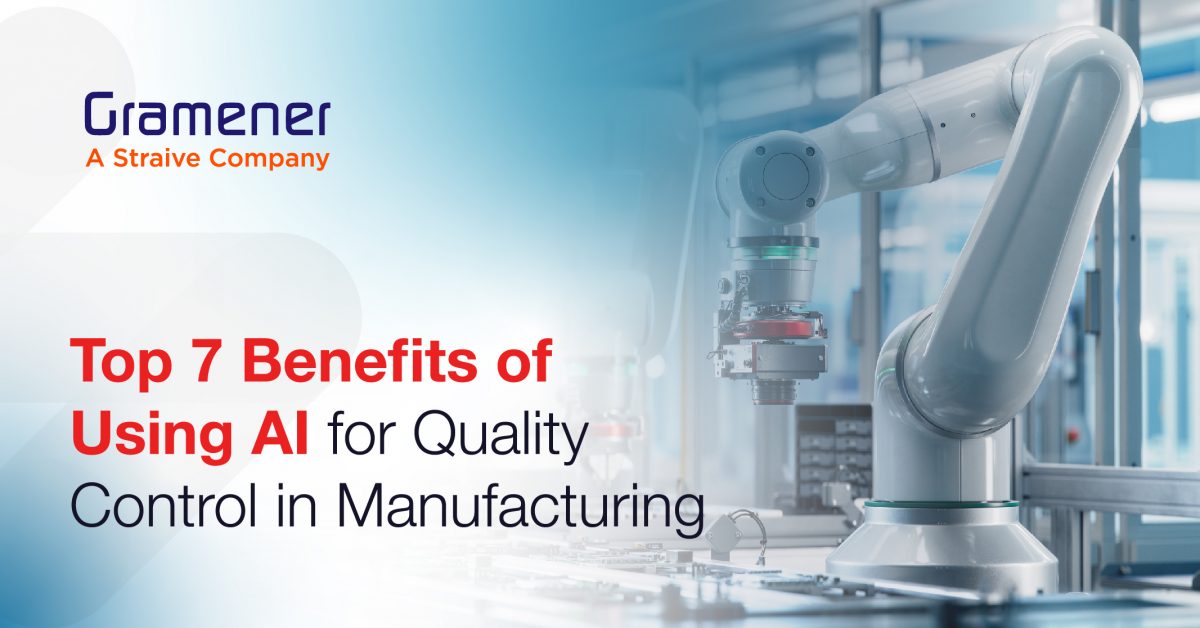AI in Manufacturing: Drastically Boosting Quality Control
Imagine the factory floors are active with precision due to artificial intelligence, where problems get caught before they become chronic. Quality control is an internal and essential part of the manufacturing process and is not only checked at the end. This isn’t science fiction; it’s a progressive reality in AI-driven quality control in modern manufacturing.
In an age of sky-high consumer expectations and competition, various manufacturers now use AI to ensure their products are good and constantly excellent. Let’s see what AI offers in quality control and why this technology has become essential for manufacturers to stay ahead of the curve.
Table of Contents
Why AI for Quality Control in Manufacturing?
There is a well-known unity between AI technologies and Manufacturing. The industry was among the first to take computer-based technology seriously in the 1970s. Today, it is a heavyweight AI in the 21st century.
There is little doubt that manufacturers are investing heavily in AI. According to estimates, the global AI market in manufacturing was valued at $3.2 billion in 2023 and is poised to grow to $20.8 billion by 2028.
There is no surprise here. Manufacturers understand and genuinely appreciate AI’s central role in their industrial journey toward Industry 4.0 and building highly efficient, connected, and intelligent manufacturing operations.
The call for more robust inspection and quality control methods is driving the integration of AI in manufacturing quality control so companies can ensure product integrity, reliability and safety. With such a pace of adoption, Gartner predicts that 50% of manufacturers will rely on AI-driven insights for quality control by 2025.
Benefits of Using AI for Quality Control in Manufacturing
Of course, the field of AI applications in manufacturing is limitless. Here are some of the most important benefits of using AI in manufacturing.

1. Quality Inspection
Traditional forms of quality control are as effective as they can be but have many built-in flaws. Even the most experienced inspectors will not catch small defects in the product. Their checks could be more efficient and consistent, especially when volume increases and the product complexity grows. The advancements in AI algorithms, machine learning, and computer vision now allow for precision and speed beyond human and basic automation capabilities.
2. Exceptional Defect Tracking
AI excels at processing massive quantities of data full of visual information for the smallest flaw that escapes human vision. From micro imperfections in electronic components to anomalies on food packaging, AI systems take advantage of one bit.
Studies have shown that AI visual inspection can yield up to 90% gain in defect detection compared with humans.
3. Real-time Monitoring and Response
AI-based quality control systems are the possibility of real-time observation of production processes and not by time intervals or stages. AI systems can identify anomalies as they are happening through the real-time, uninterrupted analysis of streams of data flowing from sensors and cameras, thereby enabling prompt intervention to minimize wastage and prevent potential downstream consequences.
4. Preventive Quality Management
As AI optimizes maintenance in production equipment, it also enriches the reliability of quality control systems in manufacturing by analyzing performance data and the appearance of early signs of equipment degradation. All inspection tools are precise and calibrated to ensure consistency in quality control outcomes, with minimal opportunities for false positives and negatives.
5. Impactful Decision Making
The benefits of AI for quality inspection and control go beyond defect detection. AI quality control mitigates most hazards related to safety, adheres strictly to regulations’ standards, and guards consumers as well as the manufacturer.
6. Autonomous Supply Chains
AI can facilitate self-sustained, continuous, and automated planning for an uninterrupted supply chain with minimal human intervention, even in turbulent conditions. Similarly, industrial companies can use AI agents to optimize challenging manufacturing schedules for throughput with minimum change-over costs, thus ensuring on-time product delivery.
7. Empowering Employees
Automating repetitive tasks would free manufacturing workers from doing them and allow them to concentrate on creative and complex tasks that improve their productivity. AI can even advise on the best next steps and alert workers to hazards lurking on the factory floor through sensors and wearable tech.
Real-World Example of AI Transforming Quality Control
Gramener-A Straive Company leverages AI to improve quality control in the cold chain logistics industry by providing real-time and predictive analytics that ensure exact temperature control, minimize spoilage, and optimize logistics. Such AI-based offerings ensure high-quality transportation of perishable goods, minimize waste and ensure cost-effectiveness.
With the help of our AI solutions, businesses can comply and inventory much more accurately. Eventually, this will make it easier to comply with the necessary regulations while staying on schedule for product delivery and maintaining proper product quality.
Want to know more? Book a free demo.

